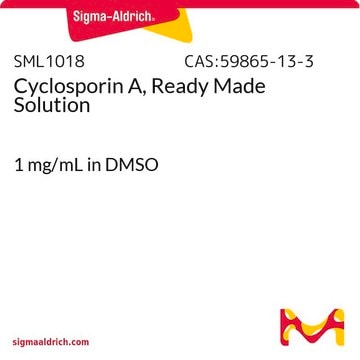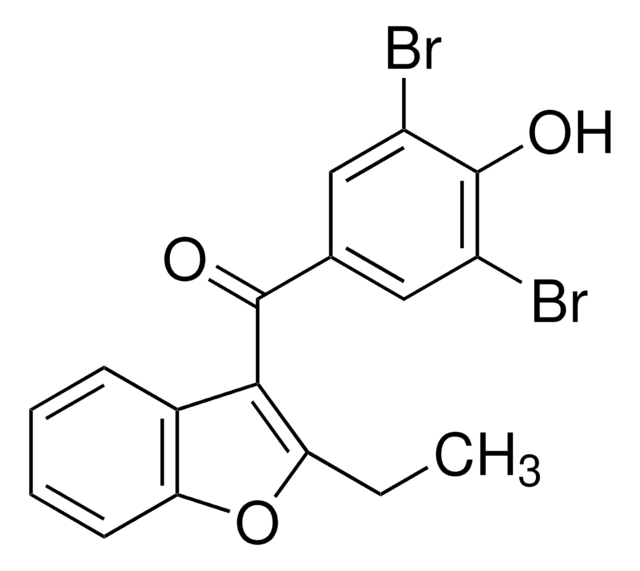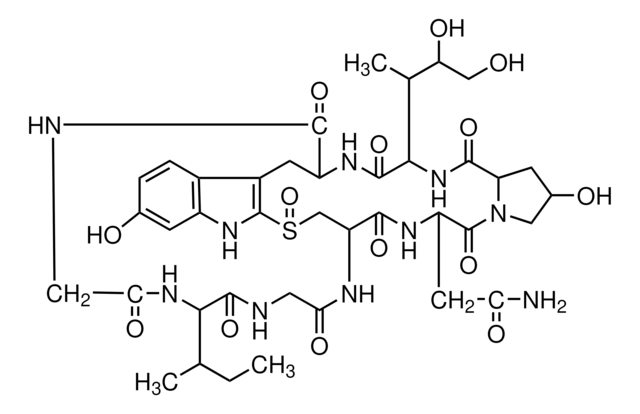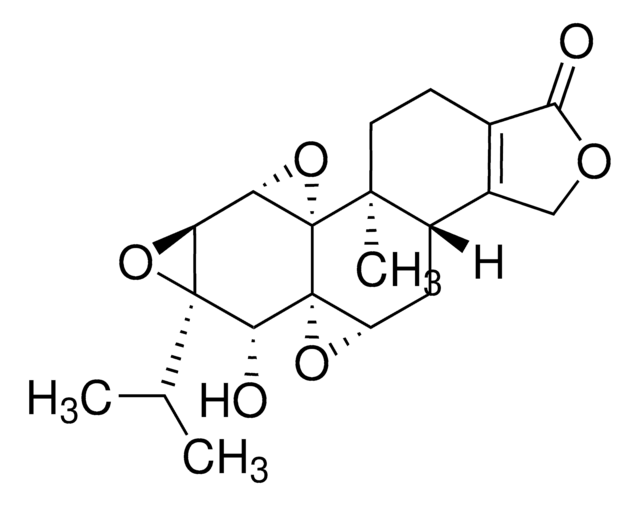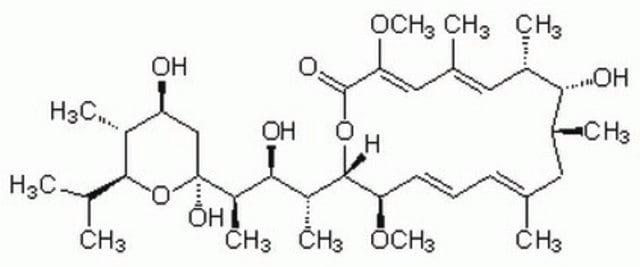239835
Cyclosporin A, Tolypocladium inflatum
Cyclosporin A, CAS 59865-13-3, is an immunosuppressant that induces apoptosis in rat thymocytes and in the murine B cell lymphoma cell line, WEH1-231. Induces cardiomyocytes formation from ESCs.
Synonym(s):
Cyclosporin A, Tolypocladium inflatum
About This Item
Recommended Products
Quality Level
Assay
≥97% dry basis
form
solid
manufacturer/tradename
Calbiochem®
storage condition
OK to freeze
color
white to off-white
solubility
DMSO: 25 mg/mL
chloroform: soluble
ethanol: soluble
methanol: soluble
shipped in
ambient
storage temp.
2-8°C
InChI
1S/C62H111N11O12/c1-25-27-28-40(15)52(75)51-56(79)65-43(26-2)58(81)67(18)33-48(74)68(19)44(29-34(3)4)55(78)66-49(38(11)12)61(84)69(20)45(30-35(5)6)54(77)63-41(16)53(76)64-42(17)57(80)70(21)46(31-36(7)8)59(82)71(22)47(32-37(9)10)60(83)72(23)50(39(13)14)62(85)73(51)24/h25,27,34-47,49-52,75H,26,28-33H2,1-24H3,(H,63,77)(H,64,76)(H,65,79)(H,66,78)/b27-25+
InChI key
PMATZTZNYRCHOR-IMVLJIQESA-N
General description
Biochem/physiol Actions
NOS induced by interlukin-1-α
Warning
Reconstitution
Other Notes
Hattori, Y., and Naranishi, N. 1995. Cell Immunol.165, 7.
Marumo, T., et al. 1995. Hypertension25, 764.
Crabtree, G.R., and Clipstone, N.A. 1994. Annu. Rev. Biochem.63, 1045.
Gottschalk, A.R., et al. 1994. Proc. Natl. Acad. Sci. USA91, 7350.
Montague, J.W., et al. 1994. J. Biol. Chem.269, 18877.
Fast, D.J., et al. 1993. J.Interferon Res. 13, 235.
Liu, J. 1993. Trends Pharmacol. Sci. 14, 182.
Fruman, D.A., et al. 1992. Proc. Natl. Acad. Sci. USA89, 3686.
Legal Information
Signal Word
Danger
Hazard Statements
Precautionary Statements
Hazard Classifications
Acute Tox. 4 Oral - Carc. 1B - Repr. 1B
Storage Class Code
6.1C - Combustible acute toxic Cat.3 / toxic compounds or compounds which causing chronic effects
WGK
WGK 3
Regulatory Listings
Regulatory Listings are mainly provided for chemical products. Only limited information can be provided here for non-chemical products. No entry means none of the components are listed. It is the user’s obligation to ensure the safe and legal use of the product.
JAN Code
239835-0GM:
239835-100MG:
239835-MG:
239835-1GM:
239835-1.1ML:
Certificates of Analysis (COA)
Search for Certificates of Analysis (COA) by entering the products Lot/Batch Number. Lot and Batch Numbers can be found on a product’s label following the words ‘Lot’ or ‘Batch’.
Already Own This Product?
Find documentation for the products that you have recently purchased in the Document Library.
Customers Also Viewed
Our team of scientists has experience in all areas of research including Life Science, Material Science, Chemical Synthesis, Chromatography, Analytical and many others.
Contact Technical Service


